Workloads

NextCloud

Postgres Cluster (PGO)

Ceph

OpenEBS

MinIO

Odoo

Cert Manager

OpenZFS
Nextcloud
Nextcloud is an open-source, private cloud storage solution with a client-server architecture that provides similar features as popular services like Dropbox and Google Drive. It can be hosted on a range of devices and offers additional functionality like permissions management, shares, and comments using a database. Users can set granular permission levels between users and groups, generate public URLs for file-sharing, and benefit from logging and security options like multi-factor authentication and brute-force protection.
Overall, Nextcloud is an effective private cloud storage solution for individuals and businesses who value data security. With a multi-language user interface and plans for future improvements, users can easily store, access, and share their data in a secure and efficient manner.
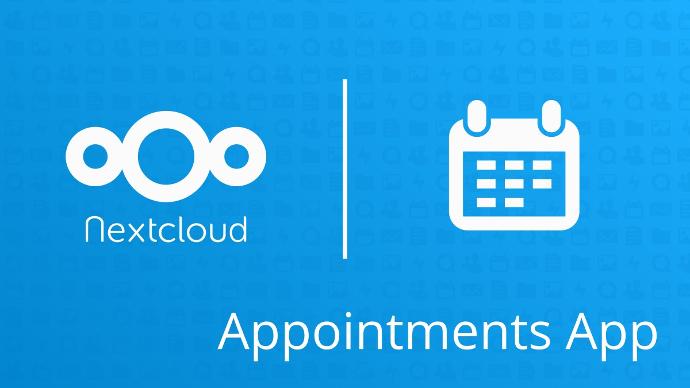
MinIO
MinIO is a high-performance object storage solution released under the GNU Affero General Public License v3.0. It is an API compatible with Amazon S3 and can handle unstructured data such as photos, videos, log files, backups, and container images with a current maximum supported object size of 5TB. MinIO's main developer is MinIO Inc., a Silicon Valley-based technology startup founded by Anand Babu Periasamy, Garima Kapoor, and Harshavardhana in November 2014.
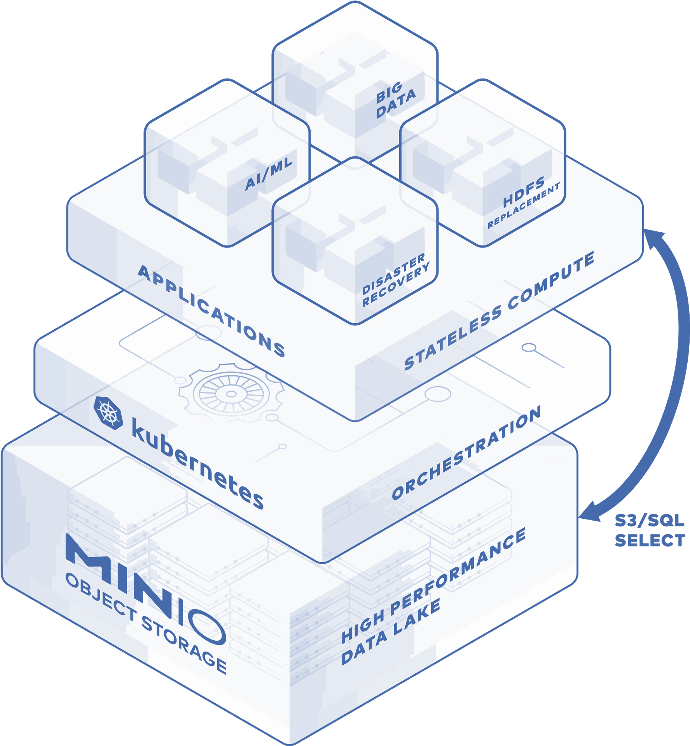
MinIO offers features like erasure coding, bitrot protection, encryption/WORM (Write Once Read Many), identity management for private cloud deployments, continuous replication for global federation, and multi-cloud deployments via gateway mode. It is hardware agnostic so it can be installed on physical or virtual machines or launched as Docker containers to be deployed on container orchestration platforms such as Kubernetes. The MinIO Client provides alternative UNIX commands support while the MinIO Client SDK enables application developers to access any Amazon S3 compatible object storage server with language bindings available for Go, Java , Python, JavaScript, Haskell, and languages hosted on top of the .NET Framework. These advantages make MinIO a powerful and easily deployable object storage solution.
MinIO has published several benchmarks to disclose their own performance and the performance of object storage in general, these include comparisons to Amazon S3 for Trino, Presto, and Spark as well as throughput results for the S3Benchmark on HDD and NVMe drives. As of April 2021, the project is re-licensed under the GNU Affero Public License Version 3 (AGPLv3). With this license switch, MinIO gives cloud providers unprecedented openness enabling customers to verify and validate that they are meeting their service level agreements while ensuring data security at rest or in transit. All of this makes it clear why many organizations prefer MinIO for their private cloud deployments.
Postgres Cluster (PGO)
Postgres Cluster (PGO), also known as PostgreSQL Operator, is an open-source project that extends Kubernetes to provide a higher-level abstraction for the rapid creation and management of PostgreSQL clusters. It provides robust features such as configuration customization, automated backup and restore, monitoring, scalability, and multi-AZ support. PGO is tested across multiple Kubernetes distributions, including GKE (Google Kubernetes Engine) and Amazon EKS (Amazon Elastic Kubernetes Service).
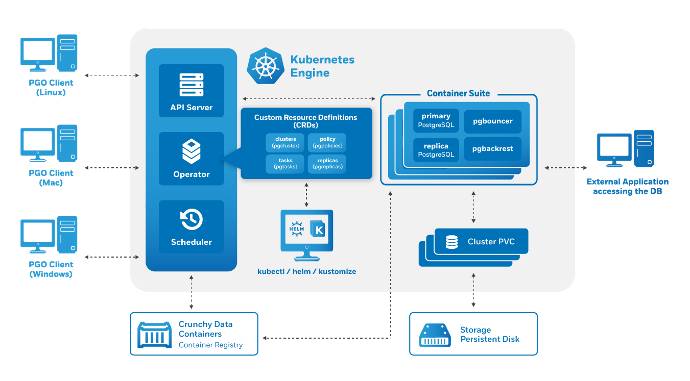
With PGO, you can quickly set up your own PostgreSQL cluster with support for storage classes like NFS or hostPath. You can easily configure the container resources used for each Postgres cluster deployment and pick from different storage classes for primary, replica, and backup storage. You can customize your PostgreSQL configuration using your own trusted certificate authority (CA). The built-in components include PL/Python + PL/Python 3, pgAudit Analyze, set_user, TimescaleDB (Apache 2 edition), wal2json pgBackRest, pgBouncer, pgAdmin 4 and Patroni. PGO also supports geospatial data with additional components like PostGIS and pgRouting.
PGO also provides easy monitoring solutions through its integrated components of pgMonitor Prometheus Grafana Alertmanager. It offers powerful capabilities like self-healing clusters which enable automatic recovery from node failure as well as high availability through distributed replication techniques. It also makes scaling simple with its ability to dynamically scale a cluster up or down depending on the need.
PGO has revolutionized the way PostgreSQL deployments are managed by making it easier to set up clusters on cloud platforms while still providing robust features that make managing those clusters simple yet efficient. Its rich set of features makes it an ideal choice for enterprise organizations looking to deploy their databases in the cloud in a secure and reliable manner.
Odoo
Odoo is a comprehensive business management software with a modular and flexible architecture. It is designed to provide small, medium, and large companies in any industry with the necessary tools to manage their operations. Odoo provides a suite of applications that includes CRM, ERP, project management, website and e-commerce solutions, financials, HR, production, and warehouse management systems. Odoo's open-source format allows for easy installation and customization for each enterprise’s specific needs.
The core components of Odoo include an extensible framework and over 30 core applications. The extensible framework enables developers to create applications and modules which can be sold or downloaded for free from the Odoo Marketplace. These apps are designed to cover various aspects of the enterprise such as customer management (CRM), human resources management (HR), production planning, inventory control, accounting and financials, project management, etc. Furthermore, users can extend the functionality of Odoo with third-party plug-ins offered on the Marketplace.
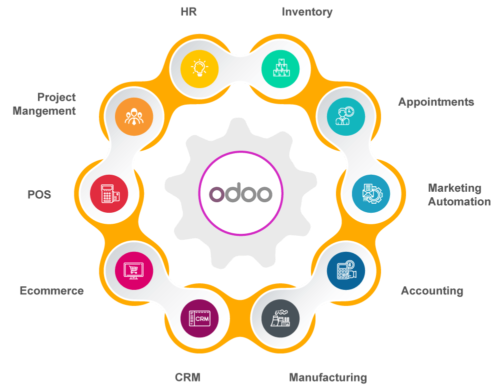
The main benefit of using Odoo is its cost-effectiveness. With an open-source platform like Odoo, users don't have to pay high licensing fees which are typically associated with proprietary software products. Furthermore, users benefit from having one unified platform that covers multiple aspects of their operations in one place - eliminating the need to invest in separate software packages for different departments or functions within the organization. Moreover, it eliminates the need for costly integration projects between different software products as all data can be stored in one single database with shared access rights across different departments in the organization.
Using a unified platform like Odoo also increases collaboration between different teams by providing them with real-time visibility into other departments' workflows through shared reports and dashboards as well as automated alerts triggered by backend processes or events such as order completion or shipments dispatched etc. This helps teams stay aligned on their tasks while allowing them to focus on strategic goals instead of manual process execution or redundant data entry tasks.
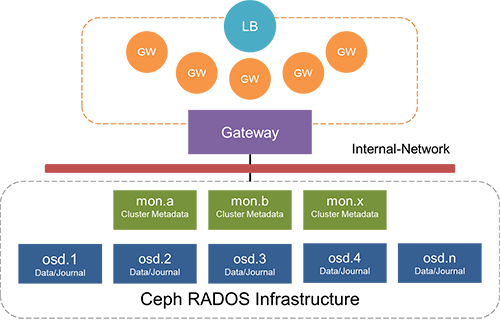
Ceph
Ceph is an open-source, distributed storage system that provides object, block, and file storage. It is designed to be highly reliable and easily scalable, making it the perfect solution for businesses with ever-changing storage needs. Ceph offers both self-managed and managed deployments, giving organizations the freedom to choose the deployment model that best fits their needs. With its fault-tolerant architecture, Ceph eliminates single points of failure and provides continuous data availability even in the event of hardware or software failures.
When it comes to features, Ceph stands out from other solutions by providing high performance and scalability. It uses a RADOS (Reliable Autonomic Distributed Object Store) object store as its foundation which allows for consistent performance across the entire cluster. Furthermore, Ceph's distributed algorithm ensures data resilience in case of hardware or node failure. Additionally, Ceph's built-in redundancy helps ensure data protection even in cases of disk failure or data corruption.
Ceph also excels when it comes to cost savings thanks to its ability to run on commodity hardware with no need for expensive proprietary drives or enclosures. This makes Ceph an economical choice for most organizations looking for enterprise-level storage solutions without having to break the bank. Furthermore, since all devices in a cluster are able to read each other’s redundant copies of data, there is no need for costly replication across devices or nodes which greatly reduces operational costs associated with maintaining a reliable environment.
In addition to cost savings and reliability benefits, Ceph also provides ease of use through its intuitive web dashboard interface which allows users to quickly access tools like monitoring and alerting functions for quick troubleshooting as well as snapshotting capabilities for backup purposes. This makes managing a cluster much simpler compared to traditional storage solutions requiring specialized knowledge and training to maintain simple tasks such as monitoring usage or restoring files from backup images.
Cert Manager
Cert manager simplifies the management of certificates for Kubernetes clusters and is a cloud-native certificate management tool. It provides an API that can be used to automate the process of obtaining, renewing, and managing certificates, as well as issuing and revoking them. Cert manager supports multiple providers such as Let's Encrypt, HashiCorp Vault, and Venafi which enables secure communication between applications deployed on private clouds.
Cert manager is highly configurable and provides different levels of control to users depending on their requirements. For example, it can be configured to automatically renew certificates before they expire or to request new certificates upon deployment of new applications in the cluster. This makes managing certificates much easier than manual methods, as there is no need for manual intervention when changes occur.

The cert-manager API also enables integration with existing tools such as CI/CD pipelines, making it easier for developers to deploy applications securely without having to manage certificate lifecycles manually. Furthermore, cert-manager provides built-in support for popular industry standards such as TLS 1.3 and SSL Certificates which further enhances security for distributed workloads.
Overall, cert-manager makes the certificate management process much simpler and more efficient than traditional methods by automating a majority of the tasks related to lifecycle management. By eliminating manual interventions required in setting up secure connections between applications running within a private cloud environment, cert-manager helps organizations save time and resources while ensuring maximum security across their workloads.

OpenEBS
OpenEBS is a cloud native storage platform built for private clouds, that brings the power of software-defined storage to Kubernetes and containerized applications. It provides persistent storage for containerized workloads, allowing them to run without disruption across multiple nodes. OpenEBS is designed to be highly reliable, consistent, and scalable with excellent performance. It also offers advanced features such as snapshotting and cloning capabilities, flexible data replication and protection policies, and multi-cluster support.
OpenEBS enables seamless storage management with its open source operator. This operator can be used to deploy and manage OpenEBS volumes on any Kubernetes cluster from cloud to on-premise environments. OpenEBS supports multiple storage engines including Jiva for replicated block storage, cStor for replicated block storage on local disks or remote block devices, and Maya for high performance NVMe direct attached storage. With all these options available, OpenEBS provides users the flexibility to choose the best option based on their application requirements.
Since OpenEBS runs in userspace rather than in the kernel space it does not require any changes to the underlying kernel. Additionally, its Litmus chaos engineering framework is responsible for testing each monthly release of OpenEBS which ensures the reliability and stability of the system. Enterprise customers have been using OpenEBS in production since 2018 with successful results due to its high availability and reliable performance characteristics.
OpenEBS makes managing private cloud infrastructures straightforward by providing an automated system that can ensure data integrity while providing businesses cost savings associated with deploying a software-defined solution over traditional proprietary systems. With its various features such as advanced data services and fast deployment times, it is no wonder why many organizations are choosing OpenEBS as their go-to solution for enterprise-scale cloud native infrastructure solutions.
OpenZFS
OpenZFS is an open-source, private cloud storage platform designed to provide a secure and cost-effective solution for data storage. The platform is built on the Z File System (ZFS), which was first released in 2001 by Sun Microsystems and is now part of the OpenZFS project. OpenZFS offers many features that make it a high performing, cloud native storage platform, allowing for faster deployments and increased reliability.
OpenZFS offers features such as copy-on-write cloning, snapshots, continuous data protection (CDP), de-duplication, compression, encryption at rest and on the wire with AES encryption, RAID level 0/1/5/6/10 support, and more. Additionally, the platform supports both synchronous and asynchronous remote replication to guarantee data availability across multiple sites. It also integrates seamlessly with existing infrastructure such as containers, virtual machines or Bare Metal servers.
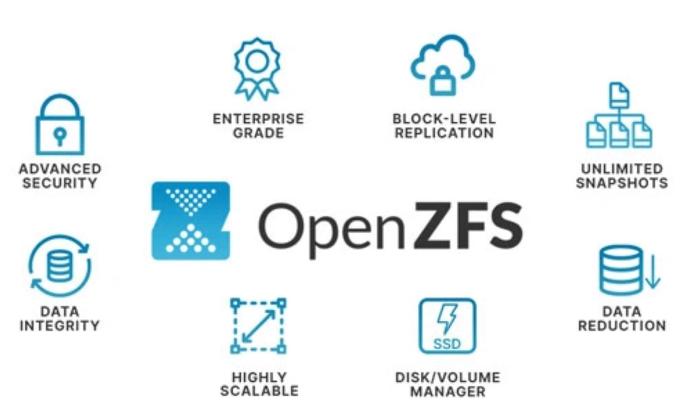
One of the main benefits of OpenZFS is its scalability; it can be used in large enterprise environments or small businesses depending on their needs. As users’ data requirements grow over time, they can easily add additional storage capacity without disruption or downtime. In addition to its scalability advantage, OpenZFS provides improved performance with its advanced caching technology which reduces latency when accessing files from disk or RAM.
Another great feature of OpenZFS is its deduplication capabilities; it allows users to store duplicate copies of files together efficiently while reducing storage space. This increases efficiency by allowing users to optimize their usage of resources for better performance and cost savings in the long run. Furthermore, as part of its cloud native nature, OpenZFS uses container orchestration tools like Kubernetes to deploy applications quickly across multiple clouds without needing manual intervention from administrators.